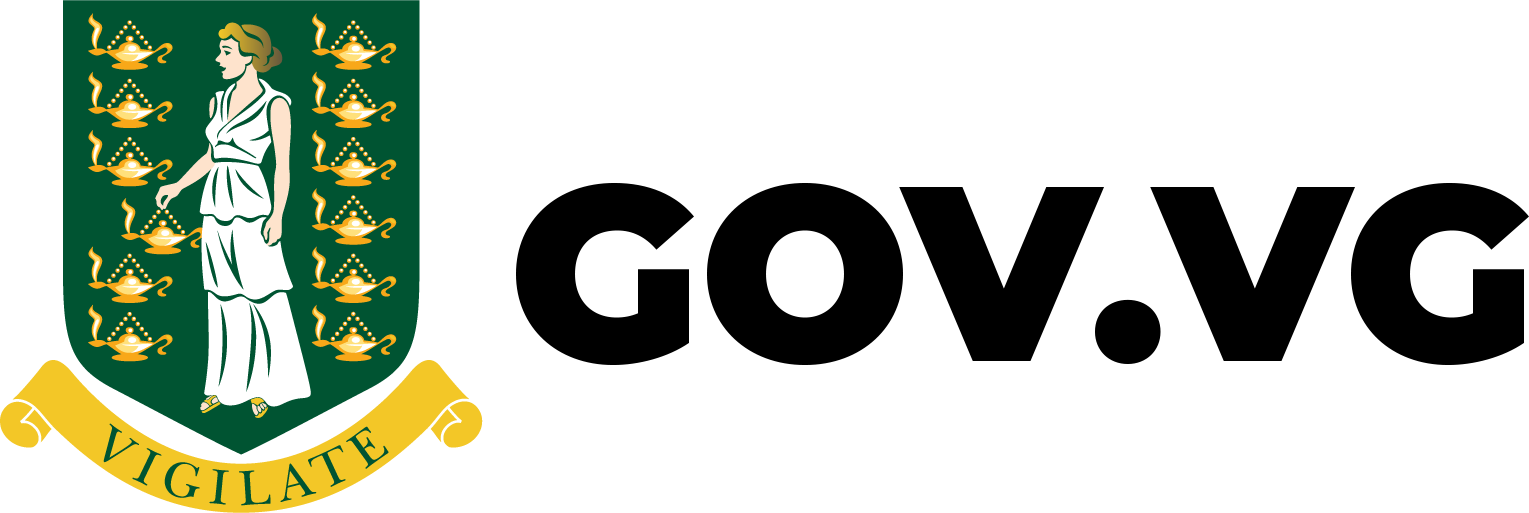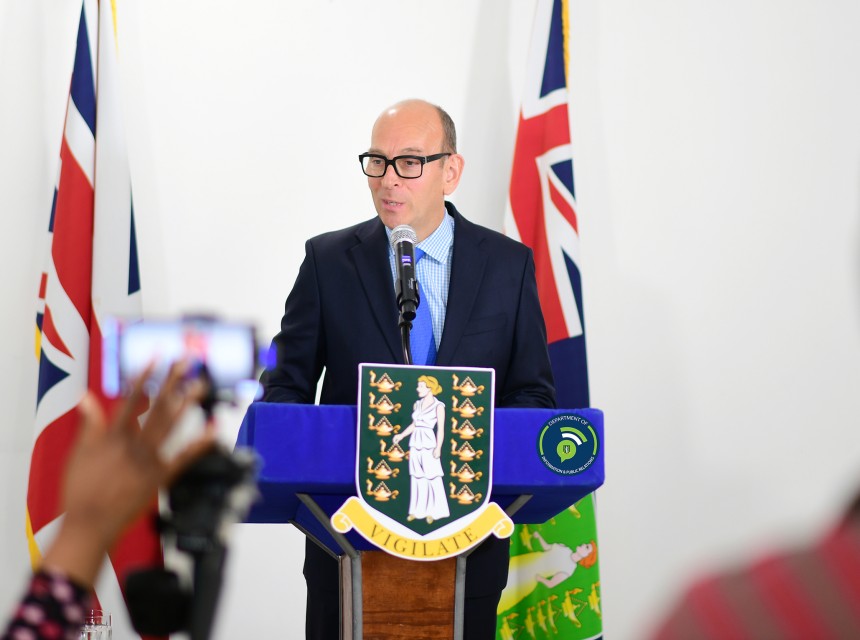Statement
Organisation:
Good morning everyone and thank you for joining me. I wanted to take this opportunity to update everyone on number of things including the vetting of the Royal Virgin Islands Police Force (RVIPF).
But first, I’d like to take a moment to remember those members of the community who have recently passed, especially Jamal Jones and Trevecca Hodge, both long-serving public officers here in the Virgin Islands. My thoughts are with their friends, families and colleagues as they grieve.
So, to come to the focus of our discussions this morning, let me make remarks about a number of security issues and let me begin with a topic which is very current and topical at the moment and that relates to the vetting of the Royal Virgin Islands Police Force. And in particular, the question of the draft order of the courts which I see has been the subject of quite a lot of commentary on the public space. My office has received a draft order from the courts in relation to vetting, that, as far as we are aware remains a draft - I assume it will be finalised shortly, and so have been waiting for the final version to be received before commenting publicly, but given that we are here today, and given it is a topical issue, I thought I would say a few words, recognising that the final version will hopefully be with us soon.
The draft order that we have received, maintains the vetting process is as an ongoing and open process. Within the terms of the order, the Judge has decided that a number of areas where the enforcement of the process could be taken forward, that such enforcement action should be stayed. So, this would be, for example, in cases where a form hadn’t been submitted or where there are gaps in the form. The regulations foresee a number of measures where an officer could be required to fulfil those obligations. The Judge’s ruling in its draft format stays those enforcement provisions. And that of course would be until such time as the final determination is reached, which would be a matter for the court, but I understand that will be later in the year. Meanwhile, the vetting process remains open and ongoing, just without the ability to apply those enforcement provisions foreseen in the Regulations.
Let me just expand on that and talk about vetting for a few minutes. As I’ve said before in these briefings and in other interviews I’ve given, we want officers in the Virgin Islands to pass vetting. The whole point of the vetting process is to enable us to have awareness within the Force, and confidence that officers meet the standards that we all expect of them. My interest in this is as Governor, given my constitutional responsibilities in particular around security, and of course the Royal Virgin Islands Police Force is at the centre of those responsibilities. Let me reiterate my vision for the police force, a vision I’ve spelt out a number of times around a number of key principles: I want to make the Virgin Islands police force as successful as it can be and that requires a properly resourced police force, that is highly professional and one that is fully vetted and one which enjoys the trust and the confidence of everyone here in the Virgin Islands. I consider vetting to be a necessary measure to ensure the integrity in the Royal Virgin Islands Police Force and to help provide for that public confidence in it. It’s also essential to preserve the safety of the officers and to ensure national security. For those reasons, I remain personally very committed to the vetting process and conducting that process correctly, properly and lawfully.
So, as I said, the process continues. Just let me share with you how that process now looks. We are in a position where around 100 police officers have submitted their vetting forms. That’s a little over a third of the entire Royal Virgin Islands Police Force which has around 270. I mentioned that just to illustrate the fact that we have a significant number of officers who have engaged with the process, who have submitted their forms, who have provided their information, and I am grateful to them for doing so. I think it helps address what may be a perception in some quarters that across the whole of the force there has been no engagement – as I said, a third of the officers who have already provided their forms and I look to other officers who are preparing their material, compiling their forms, to continue with that process. If they need help or assistance or guidance as they’re doing so, please reach out. We’re happy to provide that and move along with the process. As we’ve discussed previously in these press conferences, the nature of the questions on the vetting forms has caused some concern. Some people consider them to be intrusive. And I can understand that. By definition, vetting is a process that asks you personal questions. I know from my own experience as a civil servant for over three decades now, that vetting does probe you in areas which do feel personal. Family, relationships, finances and more. But that’s an essential part of the process. All of us as public servants, and police officers in particular, have particular responsibilities. We are entrusted with making decisions that affect peoples lives, so I think it comes with the terrain - with that sort of responsibility, you go under a form of vetting that ensures integrity and helps inspire public confidence and trust.
The particular vetting process that we have underway here in the Virgin Islands goes through a number of areas which you’ll be familiar with. It asks for basic personal information – who you are, where you live, who you live with. Officers are asked to declare any particular associations which they have which could raise a conflict of interest with the professional responsibilities. That could include for example, connections with people who have criminal records. The form also covers whether there is any personal involvement on the part of the officers, in criminal investigations by being the subject of a criminal investigation or disciplinary action. As is common practice in many domains now, the vetting process asks for details of social media accounts and then any other sources of income or wider business interests. The financial section - which I know has attracted a lot of public interest - is there for a specific purpose: to help the organisation understand whether an individual officer’s financial circumstances makes them vulnerable. Vulnerable to coercion, vulnerable to blackmail. It’s as much about protecting that officer by understanding that vulnerability as it is about anything else. The final section of the form asks officers to list the institutions where they have bank accounts or other accounts, both joint and business. This section asks for account numbers and card numbers but let me be very clear – very, very clear – and let me correct, again, something which I think has become confused in our discussions. The form does not ask for Personal Identification Numbers. It does not ask for PIN numbers. The form does not ask for any passwords. It doesn’t ask for any login or access credentials. All of that information, quite rightly, is personal to the officer and is not asked for at any stage of the vetting process.
Obviously, law enforcement being vetted is not unique to the Virgin Islands. It is something we see worldwide. Public officers, police officers in the UK are vetted and we want to see law enforcement agencies here brought to that standard here. It helps organisations manage risk and it helps maintain public confidence. It’s about ensuring that those in positions of power – and the police have enormous powers - enjoy the public’s trust. Police officers - quite rightly, given their responsibilities – can do a number of things which directly affect us. They can stop us in the street, ask us questions and search us. They can come into our homes and search through our possessions, check the environment we live in. Police officers can use force against us. These powers are all essential for a police officer to be able to do their job. But they are very significant powers, so we, as citizens, as members of the public need a level of reassurance so that we can trust that those who exercise such powers. And this goes beyond the sort of practical operations I illustrated the point with: we should all feel confident if we witness a crime, or we need help, we should approach a police officer without fear. We should feel confident that that police officer is not going to be compromised by personal loyalties or ties to the person involved in the wrongdoing to us. Vetting helps ensure that officers are able to put their public duty first and that when they wear the uniform, they serve the public without hesitation, without conflict, without fear or favour. And that’s a standard in which we all have an extremely strong interest. Building effective law enforcement, clearly, is ultimately based on trust: trust from the public, trust across agencies, and trust between colleagues.
Vetting also plays a vital role in protecting national security. Police officers, again out of necessity so they can fulfil their responsibilities, have access to sensitive information and are entrusted with decisions that can affect the safety and stability of our territory. The process of vetting, given that privileged access, is clearly essential.
Vetting protects the integrity of the police force; it strengthens the trust of the public and it preserves our national security. Vetting makes us all safer. That’s why we remain committed to a vetting process that is both lawful and robust. Of course, we want to do it properly – that’s why we’ve worked very closely with the Attorney General and her chambers every step of the way and have consulted extensively with the Force.
I also wanted to provide an update concerning the Law Enforcement Review.
The review was undertaken by His Majesty’s Inspectorate of Constabulary and Fire & Rescue Services (HMICFRS). This is an independent inspectorate that operates separately from both myself, and of Government. Fieldwork was conducted in 2023 following a recommendation made in the Commission of Inquiry. Volume One of the report was published in June 2024. The second volume was released in April this year. It provides a ten-year roadmap to enhance law enforcement and criminal justice capacity here in the Virgin Islands. Work is already underway and across both reports - around half of the recommendations have been initiated, with approximately 20% completed and a further 30% actively in progress. And this covers the breadth of law enforcement, with some examples of the work underway including improving the 911 Control Centre, developing security at the prison and putting in place workplace policies and procedures across all law enforcement agencies to improve effectiveness and efficiency.
The report - in particular, the second volume of the report - has been thoroughly debated in the House of Assembly. Members collectively wrote to me to share their concerns about some of the recommendations. I was delighted to host members of the House at Government House in June to hear their views and offer my own, and we were able to review their letter in detail, sitting around the table together. From my perspective, the work on those recommendations has to be based in close consultation and cooperation. Implementation will move forward in stages and obviously some of the recommendations – we have 375 of them in the second volume alone – some of them will be more straightforward than others. That is to be expected. We discussed that approach when we met in June, I have responded to that letter and obviously remain open to hosting further discussions with all colleagues, including the House of Assembly.
From my perspective, my next step will be a further discussion with the Premier, which I think will focus on those recommendations which have generated concerns. Be they concerns of a resourcing nature, of a political nature, or they may have constitutional implications. Great work has been done by officials, including by my office, and we’ve boiled it down to a small number of recommendations – around five percent of 375 – which do need further consideration, and I look forward to taking those discussions forward with the Premier in the coming days.
The guiding principle in all of this is that I think we work better together, and ultimately, we want the same outcome - a safe, secure and prosperous Virgin Islands for all. I’d like to take this opportunity to thank all the partners and agencies who have been working hard in taking forward the implementation of recommendations contained in the reports.
Ultimately, security - both the Law Enforcement Review and vetting - underpins prosperity. It provides stability for economic prosperity here. I’m sure we all want to see the Virgin Islands flourish and I look forward to continuing to work collaboratively, to ensure the safety and security of our community.
In that spirit, I’m delighted with the progress we’ve made in preparations for next month’s Anti-Crime Summit. Great work is in hand under the guidance of the NSC. We had an excellent launch event at the basketball court at Huntum’s Ghut which was really fantastic. I think the Summit provides a great opportunity to engage the full breadth of government, of civil society and every branch of our community to tackle crime. As I said at the launch event, the challenges we face in the Virgin Islands are not challenges we can solve by arresting and imprisoning people. We need a whole of government, whole of community, effort. Within the National Security Council which, as you know, meets on a weekly basis and is developing a much more strategic approach – we’ve already made progress in developing that ‘whole of government’ approach and I think the Anti-Crime Summit is an excellent approach which sits within that set of principles.
For Additional Information Contact:





